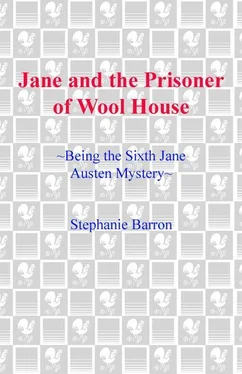Stephanie Barron - Jane and the Prisoner of Wool House
Здесь есть возможность читать онлайн «Stephanie Barron - Jane and the Prisoner of Wool House» весь текст электронной книги совершенно бесплатно (целиком полную версию без сокращений). В некоторых случаях можно слушать аудио, скачать через торрент в формате fb2 и присутствует краткое содержание. Жанр: Исторический детектив, Иронический детектив, на английском языке. Описание произведения, (предисловие) а так же отзывы посетителей доступны на портале библиотеки ЛибКат.
- Название:Jane and the Prisoner of Wool House
- Автор:
- Жанр:
- Год:неизвестен
- ISBN:нет данных
- Рейтинг книги:4 / 5. Голосов: 1
-
Избранное:Добавить в избранное
- Отзывы:
-
Ваша оценка:
- 80
- 1
- 2
- 3
- 4
- 5
Jane and the Prisoner of Wool House: краткое содержание, описание и аннотация
Предлагаем к чтению аннотацию, описание, краткое содержание или предисловие (зависит от того, что написал сам автор книги «Jane and the Prisoner of Wool House»). Если вы не нашли необходимую информацию о книге — напишите в комментариях, мы постараемся отыскать её.
Jane and the Prisoner of Wool House — читать онлайн бесплатно полную книгу (весь текст) целиком
Ниже представлен текст книги, разбитый по страницам. Система сохранения места последней прочитанной страницы, позволяет с удобством читать онлайн бесплатно книгу «Jane and the Prisoner of Wool House», без необходимости каждый раз заново искать на чём Вы остановились. Поставьте закладку, и сможете в любой момент перейти на страницу, на которой закончили чтение.
Интервал:
Закладка:
Mr. Hill nodded. “One of perhaps three or four of the richest men in England. There was talk of an earldom just last month, before Luxford took ill.”
Frank let out a faint whistle. “And yet he cut his daughter off without a farthing when she married Seagrave.”
“To say that she was cut off is not entirely exact.” Mr. Hill pressed a napkin delicately to his lips, as though to contain his own huge excitement. “I believe the Viscount lived in fear of his daughter's marrying a worthless adventurer, and we may judge him to have regarded Seagrave in such a light Her portion was no less than an hundred thousand pounds, along with some considerable property in Berkshire, that came to her through her mother's line.”
“Her portion!” I said. “But Louisa is his only child. Is the bulk of the estate entailed upon heirs male? Shall it go to a cousin, perhaps?”
“I am coming to that,” Mr. Hill informed me. “Luxford settled this marriage portion upon his daughter with the express provision that she must marry with his blessing.”
“Louisa eloped,” I told him.
“And was thrown off by her family. I am afraid that the Viscount took then-Lieutenant Seagrave in such violent dislike, that he sought to be punitive in the management of his daughter's affairs. Louisa's marriage portion was made over to her issue, inheritable only upon her husband's death,”
“The sole purpose being to keep the property from Tom,” Frank said.
“Exactly. And so we proceed to the Viscount's entire estate — which, according to the knowledgeable fellows at the Morning Gazette, is estimated in the millions of pounds. If Louisa Seagrave is a married woman at the moment the will is read, the estate and tide are to pass to her eldest son — provided she divorces her husband within the year, and her son adopts the Luxford family name of Carteret.”
“Good God!” I cried, and stared at my brother. “What an inducement to unhappiness and vice! Might any woman be equal to refusing such temptation?”
“And is Louisa then empowered to act as her son's guardian and trustee?” Frank enquired.
Mr. Hill smiled thinly. “The late Viscount was hardly so forgiving. He offers his estranged daughter ample funds — some ten thousand pounds per annum — and the use of the Dower House at Luxford; but the guardianship of her son and the management of his affairs, including his vast fortune, will be undertaken by Sir Walter and Lady Templeton — trustees to the estate.”
“And thus we comprehend the benevolent activity of Lady Templeton in Lombard Street,” I said softly.
“Even did we charge Lady Templeton with acting in her own interest,” Frank countered, “the benefit to Louisa must be considerable. She might be returned to the circle in which she was born; her sons receive every advantage presently denied them; and her infant daughter be reared in the most select society. What mother could turn aside?”
But I was hardly attending. I was in the grip of an idea so dreadful I could barely pronounce it.
“You said, Mr. Hill, that the property was disposed in the above manner, if Mrs. Seagrave were married woman. “There is another provision, surely?”
Mr. Hill drained his Madeira to the dregs before replying. “It is a preoccupation of your Great Man, I find, to grasp in death what he could not obtain in life. The Viscount was a very Great Man; and his spirit of fun, shall we say, was commensurately large. Louisa Seagrave will inherit the entirety of her father's fortune, and her son become the next Viscount, without recourse to guardians, trustees, or settlements — provided that when the will is read, Mrs. Seagrave is already a widow.”
Chapter 25
What the Lady Knew
1 March 1807, cont.
“DEAR GOD,” I WHISPERED, WITH MY EYES UPON THE ceiling of the inn's drawing-room, as though Louisa Seagrave might overlisten our words in her poisoned dreams. “We must discover what she knew.”
Frank stared. “You think it possible …”
“That she arranged for her husband's dishonour? Paid off Eustace Chessyre to commit an act so obscene, the entire Navy must take notice, and charge Tom Seagrave with a violation of the Articles of War? Entirely within the range of her powers, I assure you!”
“But that is madness — to send her husband to the gallows! No woman could contemplate such an act! No wife could be capable of it!”
I did not reply. Restlessly, I commenced to turn about the room, my fingers smoothing the pleats of my gown. “What did Louisa know of her father's will, and when did she know it? From Lady Templeton, as lately as Thursday, when I found the two together in Lombard Street? Or far earlier — before, let us say, the Stella sailed in January under sealed orders? How much time would Louisa require, to effect her husband's ruin?”
“If she were well-acquainted with Chessyre — and he had been her husband's lieutenant for many years — very litde time at all,” answered my brother grimly.
I wheeled upon Mr. Hill. “You said, I think, that the Viscount began his decline a month ago?”
“That is as the papers would have it. But the death itself was quite sudden.”
“And the Stella Maris engaged the Manon some seven weeks since. If we would have Louisa responsible for Chessyre's plot, then we must accept the idea that she knew of the Viscount's provisions well before her father's illness. In a communication from Lady Templeton, sent during the Christmas season, perhaps? Or — if the Viscount's sense of fun, as you call it, extended to the torment of his daughter — in a communication from the gentleman himself?”
My thoughts raced as a fevered pulse; but the gentlemen followed as swiftly behind. We all of us spoke in lowered tones, in deference to the public nature of an inn.
“The moment of the Viscount's passing is immaterial,” Mr. Hill pointed out. “What is vital is the moment of his interment — and the subsequent reading of the provisions of his will. Mrs. Seagrave today is no different than she was before; but by the dinner hour on Tuesday she might be anything.”
“We may exonerate Lady Templeton of murder at least,” observed my brother ironically. “You have provided her with the strongest inducement to ensure Tom Seagrave's survival. Without him, Lady Templeton gets not a farthing to administer or spend.”
“We must interrogate the aunt regardless,” I said, “though we must venture into Kent to do it. Without intending to incite murder, Lady Templeton may have done so with simple gossip. If she was aware of the Viscount's provisions before his death, and communicated them to her niece—”
“It cannot prove that Louisa Seagrave decided to murder her husband,” Frank insisted impatiently. “And by so contrived a means! She should better have put arsenic in Tom's plum pudding at Christmas, than attempted a hanging by court-martial!”
“Poison will out,” I reminded him. “How much more to be preferred, is an official disgrace — an impartial judgement — a public hanging… and the widow rather to be pitied than suspected of evil. The entire affair bears the mark of Louisa's subtle mind.”
“And yet, not subtle enough,” opined Mr. Hill. “For Mrs. Seagrave to achieve the object you would set her, Miss Austen, she must have effected her husband's death by Tuesday at the latest; and you must admit that that is not very likely.”
“Not if she is watched,” I said, “and knows herself to have fallen under suspicion. But if she feels secure … we might catch her in the very act…”
The two men were silent.
“Death might have been achieved already if Tom Seagrave's court-martial had not been suspended,” I persisted. “Thus far, Louisa's scheme marched to plan. She was listening for the gun that should mark her husband's execution when I found her in Lombard Street on Thursday.”
Читать дальшеИнтервал:
Закладка:
Похожие книги на «Jane and the Prisoner of Wool House»
Представляем Вашему вниманию похожие книги на «Jane and the Prisoner of Wool House» списком для выбора. Мы отобрали схожую по названию и смыслу литературу в надежде предоставить читателям больше вариантов отыскать новые, интересные, ещё непрочитанные произведения.
Обсуждение, отзывы о книге «Jane and the Prisoner of Wool House» и просто собственные мнения читателей. Оставьте ваши комментарии, напишите, что Вы думаете о произведении, его смысле или главных героях. Укажите что конкретно понравилось, а что нет, и почему Вы так считаете.












